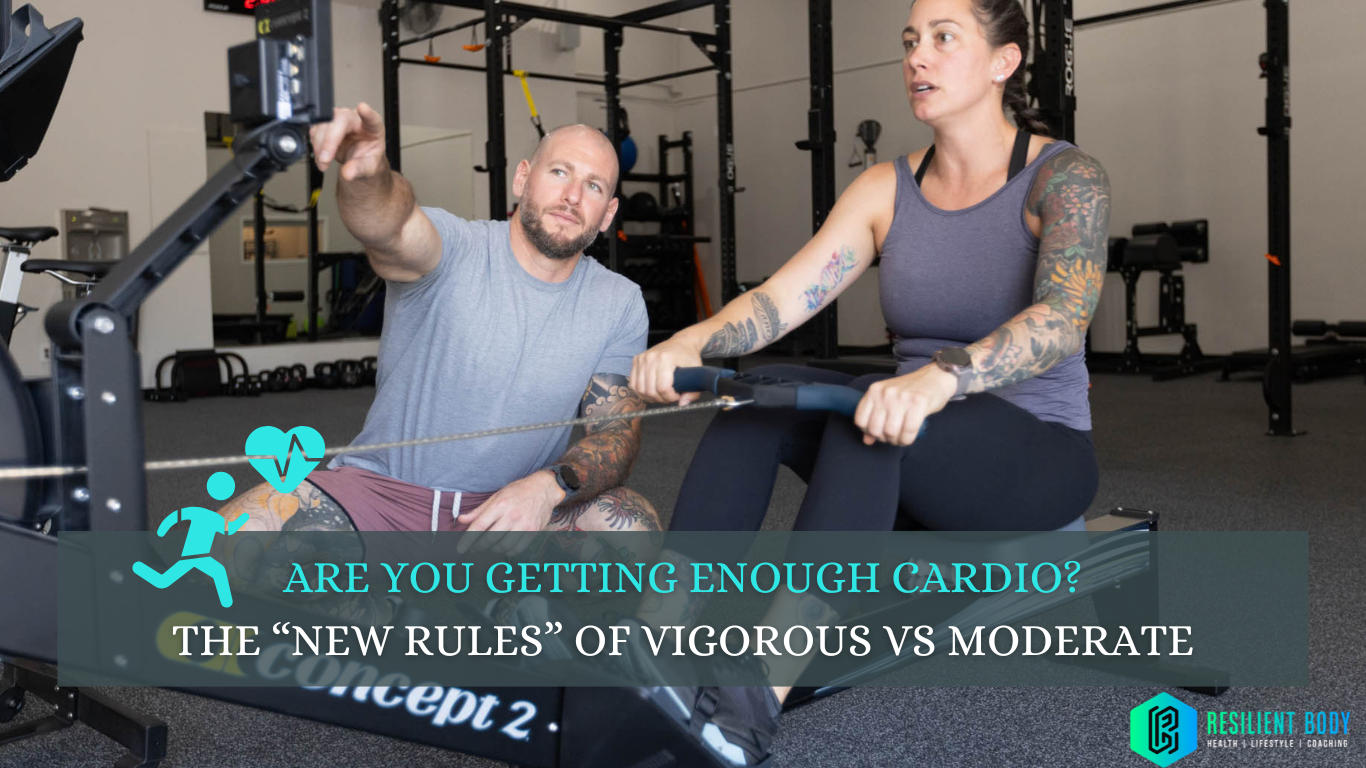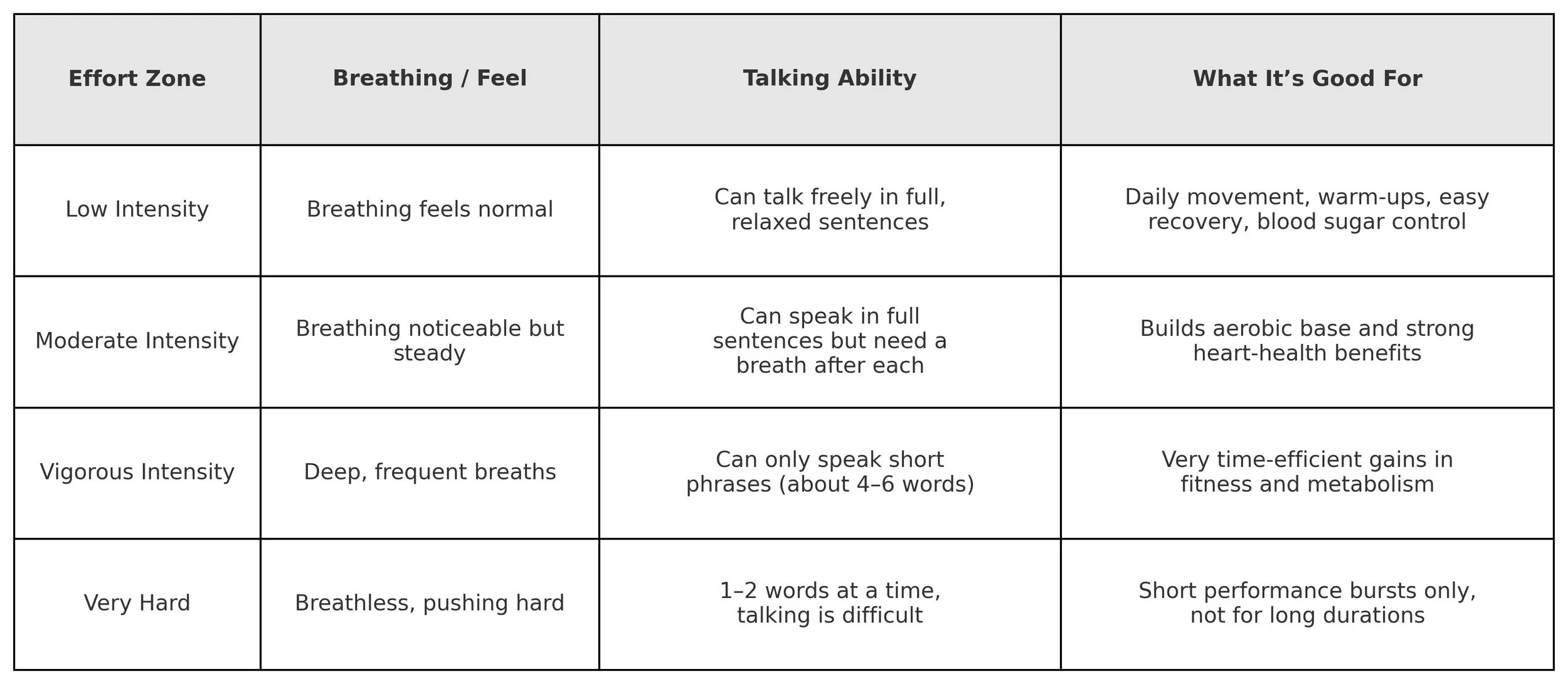Are You Getting Enough Cardio?The “New Rules” of Vigorous vs Moderate
The “New Rules” of Vigorous vs Moderate (Without a Heart-Rate Monitor)
You may wonder if you’re doing enough cardio, what types you should be doing to get the most benefit, can you get away with just walking, etc.
Enough to protect your heart.
Enough to stay lean.
Enough to keep up with your kids… or grandkids.
For years, public health guidelines were simple:
150 minutes/week of moderate, or
75 minutes/week of vigorous exercise
A beautiful and simple 2:1 ratio for vigorous to moderate. Still good advice — but new research suggests a huge potential unlock:
A major 2025 Nature study found:
1 minute of vigorous effort can deliver the benefits of 4–9 minutes of moderate effort
depending on the outcome (heart health, diabetes risk, etc.)
That’s a massive difference — especially for people who don’t have endless hours to train!
For reference, that study was huge and included 73,485 participants with 2675 all-cause mortality events, 545 CVD mortality events, 2359 MACE events, 1836 type-2 diabetes events, 538 physical activity related cancer mortality events, and 2662 physical activity related cancer incidence events.
So… 10 minutes a week and we’re good?
Not exactly.
And here’s why context matters…
data summary image credit: The Independent
⚠️ Caveat 1: Accelerometers ≠ physiology and wearables can’t capture it all
This study in particular used wearables. These devices track movement, heart rate, etc; but not:
heart strain
metabolic stress
ventilatory load
A fast walk for someone deconditioned may be “moderate” to a sensor but vigorous for that individual
2-3 minute Interval sprints for a trained athlete may read “moderate” due to efficient movement and conditioning
Individuals can differ greatly here. Even from one extremely well conditioned person to another.
So movement doesn’t always equal internal effort or the metrics of concern in health outcomes. To note, the Nature study only used accelerometry data and not heart rate, VO2 data, etc.
⚠️ Caveat 2: MET values are misleading
What counts as a “moderate MET”?
It depends entirely on the person, their fitness, and their physiology. The equivalents given don’t always track and the units aren’t widely used or accepted even though they are used in various studies and reccomendations. These units are often used to account for exercise intensity which can muddy waters further. Also, what the heck is a MET anyway?
Which brings us to…
The simplest measure of cardio intensity:
Breathing → Talking Test
Forget numbers.
Forget acclerometry.
Forget MET charts.
Your breathing gives the truth.
If you can talk freely → easy low intensity.
If talking takes work → likely moderate.
If talking stops or a couple/few words→ likely very high effort.
So what should YOU aim for each week?
Here’s a realistic, science-aligned framework:
Still Good
150–300 minutes/week of moderate
(brisk walks, steady cycling, easy running)
The foundation of heart & metabolic health.
Also Likely Good Now and Great When Shorter on Time
A mix of moderate + vigorous bursts
Example:
3 sessions/week
• 20–30 minutes moderate or what you have time for. These can be brisk walks or hikes depending on your level.
• 2–4 × 60–120s (or even slightly longer time) harder vigorous intensity intervals
Same overall minutes → significantly less time for the payoff
Best
A plan built around your breathing response
—not generic charts or someone else’s “zones”
What’s light vs moderate vs vigorous for YOU is what matters.
A seasoned runner’s “moderate” may be vigorous for a beginner.
Breathing levels and corresponding health metrics personalize everything.
What changes for normal people?
You don’t need…
endless time
to be a cyclist or runner
a fancy fitness tracker
You do need…
movement that elevates your breathing
perhaps some uncomfortable minutes each week if you’re shorter on time or want more unique benefits
a mix of easy + challenging cardio to get the most bang
A small dose of well-applied intensity goes a very long way.
Strength + Cardio = Complete Health
Strength training: We are obviously huge pushers of this because…
✔ Keeps muscle & bone strong
✔ Improves insulin sensitivity
✔ Protects joints and confidence
✔ Supports longevity
✔ It’s Armor!
Cardio adds:
❤️ Strong heart + vessels
🔥 Better metabolic flexibility
🧠 Cognitive & stress benefits
🏃 Ease of movement in real life
Strength helps you stay capable.
Cardio helps you derive maximal health benefits.
You deserve both.
The Resilient Body Approach
We make this simple:
✔ We show you what the right intensity actually feels like
✔ We program short, efficient workouts that include some vigorous intensity cardio to make sure you get it in
✔ We coach your breathing feel/cues — not just reps
✔ We help you progress safely and consistently
When in doubt during an intense bout, it isn’t punishment.
It’s an investment in your future energy, capacity, and confidence.
👉 Ready to find your cardio “sweet spot”?
Book a Discovery Session.
We’ll build a plan that fits your life — not the other way around.
Move smarter.
Live stronger.
Stay resilient.
📣 Quick Announcements:
🥳 Holiday + 5 Year Anniversary Workout and Party— RSVP HERE or in Your Email Invite - December 6th– 10a-1p
Partner style workout with prizes (bring a friend or family member to get sweaty with)
Bring your favorite brunch/lunch dish to share
Hang out and have fun!
🏋️♂️ New Personal Training Slots Available – Book a consult if you’re ready to level up
Health and Wellness Coaching slots have closed for now but will reopen again next year
💬 Got questions? Reply here or ask your coach next time you're in






